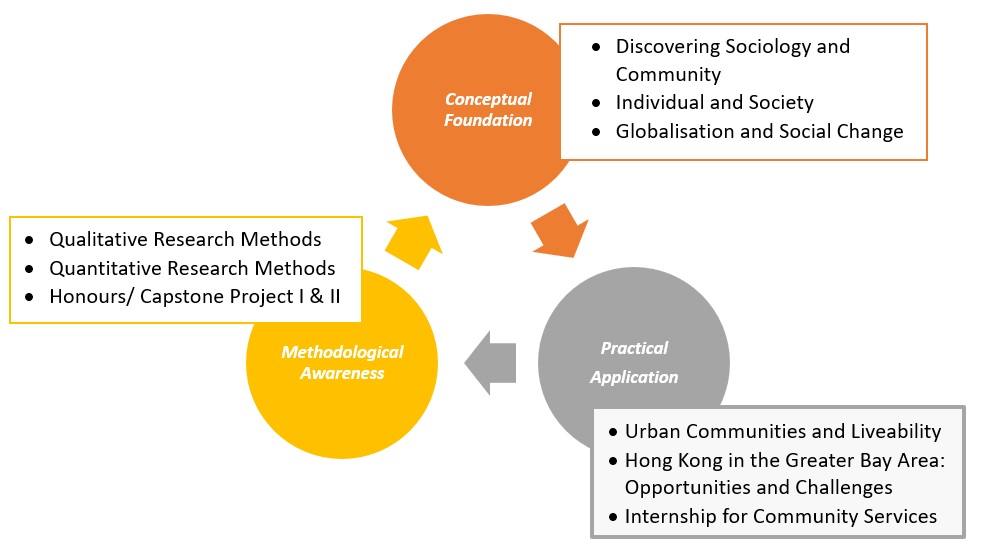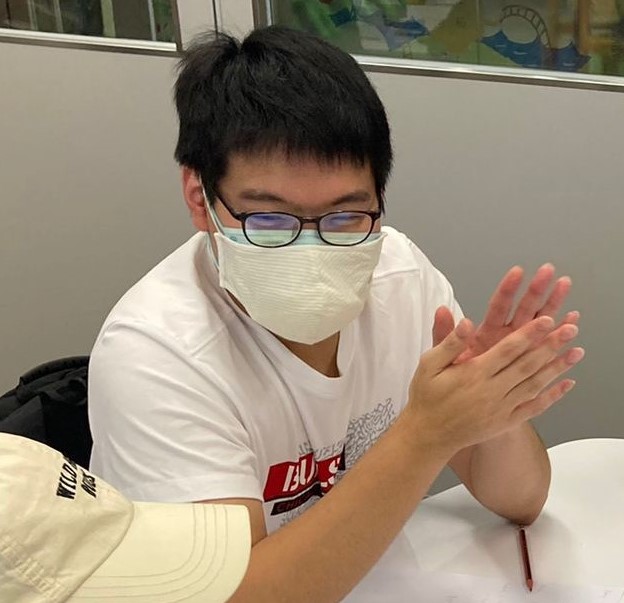Programme Description
The programme aims to provide students with a solid training in social sciences inquiry so that they can understand the nature and complexity of social and cultural challenges faced by individuals in communities of different scales and at different levels. Students will be introduced to issues concerning class, ethnicity, gender, social inequality, and cultural diversities. They will also participate in discussions related to social transformations and the changing social structures and institutions in Hong Kong, Mainland China and the contemporary world. Students will be expected to understand and explain social issues with the use of appropriate quantitative and qualitative data. The programme also enhances students’ conceptual and problem-solving skills with a view to promoting personal growth and community practices. Upon the completion of the programme, students will be able to apply social scientific knowledge and skills to understand and explore possible responses to a wide range of community issues at global, national, regional and local and individual levels.
| Study Mode | Normal Period of Study | JUPAS Code | EdUHK Programme Code |
|---|---|---|---|
| Full-time | 2 Years (for Senior Year Admissions) | N/A | A2B101 |
| Enquiry (Admissions) | Enquiry (Programme) | Download Leaflet | Programme Webpage |
|---|---|---|---|
| (852) 2948 6886 Submit Your Enquiry |
Ms Jane Lee (852) 2948 7707 jclee@eduhk.hk |
Download Leaflet | Programme Webpage |
Programme Aims
The objectives of the Bachelor of Social Sciences (Honours) in Sociology and Community Studies programme are:
- To equip students with sociological perspectives to understand the transformations and developments of Hong Kong, China and the world;
- To enhance students’ conceptual and problem-solving skills with a view to promoting personal growth and community sustainability;
- To develop students’ competency in using appropriate research methodologies in social inquiries
Programme Features
Sociology-based
Analyses the development of Hong Kong and the regional community with the use of appropriate sociological concepts and theories.
Community-driven
Develops practical and sustainable plans for promoting the betterment of communities at local and regional levels.
Experiential Learning
Enables students to apply their knowledge and skills through participating in internship.
Programme Intended Learning Outcomes (PILOs)
To align with the University’s commitment to whole person development and the framework of “PEER & I”, the programme aims to prepare graduates to:
- Analyse social issues and problems facing communities at different levels with the use of appropriate qualitative and quantitative research methods (PILO1);
- Employ major sociological concepts and theories in accounting for contemporary social, cultural, political and economic changes (PILO2);
- Develop evidence-based strategies to enhance quality of life and social well-being in the community (PILO3);
- Demonstrate ethical awareness and positive orientations towards personal growth and community development (PILO4)
What Our Students Say
Programme Structure
| Domain | Credit Points (cps) |
|---|---|
| Major | |
| - Major Core | 18 |
| - Major Electives | 6 |
| - Internship | 3 |
| - Cross-Faculty Core Course | 3 |
| - Major Interdisciplinary Course | 3 |
| Final Year Project | |
| - Honours Project I: Research Methods and Proposal / Capstone Project I: Research Methods and Proposal | 3 |
| - Honours Project II: Research Report / Capstone Project II: Project Output | 3 |
| Electives / Minor | 15 |
| General Education (GE) | 6 |
| Total: | 60 |
| Information Technology Competence Requirement | |
Note:
(1) Classes will be held in Tai Po Campus and Tseung Kwan O Study Centre / North Point Study Centre / Sports Centre / Kowloon Tong Satellite Study Centre as decided by the University.
(2) Students admitted into this programme are required to visit the Greater Bay Area (GBA) and/or other parts of Mainland China. Programme may also require students to participate in other non-local learning experience for completion of the programme. While the visits are heavily subsidised, students are still required to contribute part of the estimated cost of the visits ("student contribution"), whereas personal entertainment, meals expenses, travel document fee and personal insurance costs will not be supported. The estimated cost of the visits for students admitted to the 2024/25 cohort is not available yet as it is subject to a variety of factors such as changes to the cost of the visits as a result of inflation, trip duration, traveling expenses, the exchange rate, etc. The exact amount of student contribution is thus not available.
List of Major Courses (All required)
| No | Course Title | ||
|---|---|---|---|
| Major Core Courses (21 cps) | |||
| 1 | Discovering Sociology and Community | ||
| 2 | Individual and Society | ||
| 3 | Globalisation and Social Changes | ||
| 4 | Hong Kong in the Greater Bay Area: Opportunities and Challenges | ||
| 5 | Qualitative Research Methods | ||
| 6 | Quantitative Research Methods | ||
| 7 | Cross-Faculty Core Course | ||
| Major Elective Course (6 cps) (Choose 2 out of 6 electives) | |||
| 8 | Values Pluralism and Cultural Diversity in Hong Kong | ||
| 9 | NGOs and Social Innovation | ||
| 10 | Comparative Social Policy | ||
| 11 | Sports and Community Development | ||
| 12 | Digital Communities in the Information Age | ||
| 13 | Urban Communities and Liveability | ||
| Internship (3 cps) | |||
| 14 | Internship for Community Services | ||
| Major Interdisciplinary Course (3 cps) | |||
| 15 | The Sustainable Development Goals and Education | ||
| Final Year Project (6 cps) | |||
| 16 |
Honours Project I: Research Methods and Proposal / |
||
| 17 |
Honours Project II: Research Report / |
||
The Programme emphasises the following three areas: (a) conceptual foundation; (b) methodological awareness; and (c) practical value. At the conceptual level, the programme aims to familiarise students with key concepts considered as the building blocks of sociological analyses, including: (1) power, (2) class and inequality, (3) institutions, (4) social structure, (5) culture, (6) gender, (7) identity, (8) intersectionality, (9) globalisation, and (10) risk. At the methodological level, the programme aims to develop students’ competency in the following two areas: (1) designing and conducting social survey; and (2) designing and conducting fieldwork. Students are expected to be able to develop plans for administering a research, identify the strengths and weaknesses of research methods through literature review, and interpreting results. At the practical level, the programme aims to provide ample opportunities for students to link their sociological knowledge with different community concerns and opportunities.

The Cross-Faculty Core Course (CFCC) will comprise 3 individual components with 1 credit point each and separately assessed with the aim to widen students’ horizon and look beyond Hong Kong. In Component I, lectures with topics related to Basic Law / National Security will be arranged; in Component II, students will have the opportunities to undertake visits in Greater Bay Area; in Component III, a variety of themes which are linked to the University’s development niche areas will be offered by Faculties.
Apart from the major courses, the programme includes the Minor(s)/ electives domain and the general education domain. Students are free to choose elective courses offered by any of the University’s departments. They have the option of taking a Minor of 15 cps of taught courses in the Elective domain for graduation with a Minor, subject to specific requirements of the Minor(s).
Students of the programme are encouraged to adopt either “Education and Society” Minor or “Sustainable Tourism” Minor. These Minors are developed with a view to strengthening students’ awareness towards the practical values of sociological inquiries. On one hand, “Education and Society” offers a holistic treatment of the linkage between education, social development and ethics. This Minor serves as an introduction to sociology of education, a sub-discipline within which sociological connections between education, power, and knowledge are explored. On the other hand, the “Sustainable Tourism” introduces students to the linkage between the environment, community development and the tourist sector. This Minor serves as an introduction to environmental sociology, a sub-discipline within which sociological connections between the environment, society and science are explored.
Students admitted in 2023/24 are only required to complete 6 cps in total for General Education.
For detailed information and the course synopsis about General Education courses, please visit the website at www.eduhk.hk/geo.
Medium of Instruction
The programme will mainly be conducted in English. Most of the Major courses will be taught in English. For some non-Major courses, Putonghua or Cantonese will be adopted as the medium of instruction when the language is considered to be the most effective for teaching.
Career Prospects/Professional Qualifications
This programme will play special attention to the fostering of portable skills and generic competencies that could be applied in a wide range of professional settings. The programme’s emphasis on equipping students with a full range of research tools, both qualitative and quantitative, will benefit students’ career development significantly. Its focus on a sociological perspective in community contexts will also ensure that much of what students learn here would have practical applications.
Graduates can find employment across a wide range of fields, including: community development workers, non-governmental organisation officers, community liaison officers in government departments and public organizations, international aid/development workers, public relations officers, social and marketing researchers, research assistants in academic institutions, and youth workers.








 Back to top
Back to top